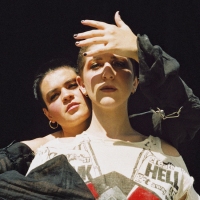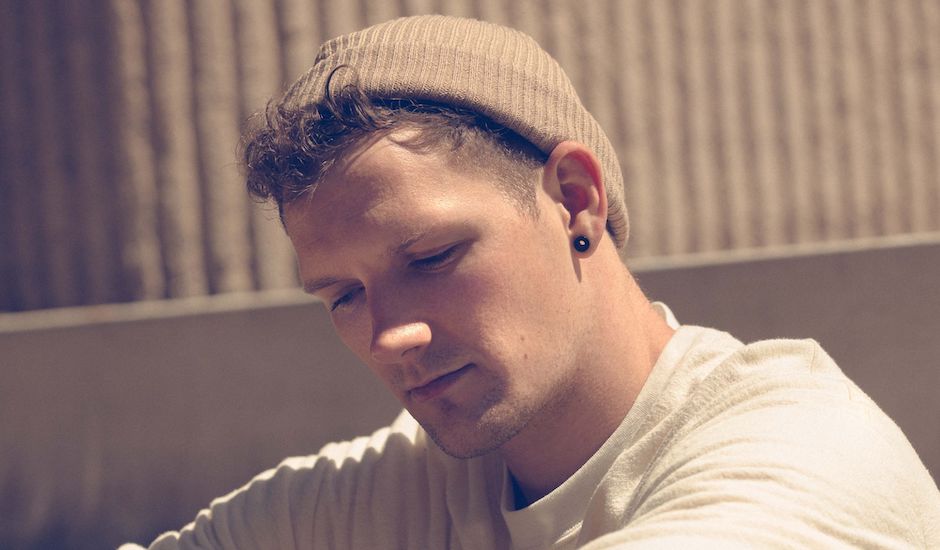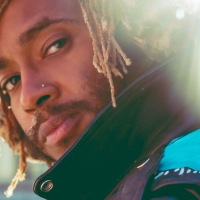 Overcoats are ready to fight, and give the world hope in doing soOn their second album The Fight, the Brooklyn duo step forward as a source for anger-fuelled music in trying times.
Overcoats are ready to fight, and give the world hope in doing soOn their second album The Fight, the Brooklyn duo step forward as a source for anger-fuelled music in trying times.

After six years, The Kite String Tangle is ready to embrace darkness
Once known for his vocal-heavy synth-pop, the Brisbane musician’s new album - C()D3X - sees him set his sights on the club.
Header image by Cybele Malinowski.
Over the last six years, The Kite String Tangle has had one of the most unexpected trajectories in Australian electronic. On his break-out 2014 single Given The Chance, the musician - real name Danny Harley, from Brisbane - seemingly stepped forward as a bright new face in subtle indie-pop; shimmering synth melodies intertwining themselves with subtle, washed-out vocals that soundtracked much of the mid-2010s indie explosion. It was a song that for many, soundtracked the sun-lit summer festivals that came the year after, with the single’s tingling euphoria one that had The Kite String Tangle attached with all the usual tags: “Australia’s next big thing”, “one to watch” and the list continues.
The Kite String Tangle’s debut EP, 2014’s Vessel, solidified his knack for light, electronic-shaded indie-pop, and when his debut album arrived in 2017, he used the opportunity to flesh out this sound into its most potent and rich; guests including Bridgette Amofah and Montgomery - as well as Danny’s own vocals - weaving in and out of instrumentals that teeter from subtle indie to percussion-led, swelling house.
At the time, it felt like the perfect evolution for The Kite String Tangle. The eponymous record was a meeting point between his distinctive, ‘classic’ sound and a heightened emphasis on electronica that could pave future paths in eclectic dance-pop, which is why it was so surprising to hear his next release, In A Desperate Moment, be almost the complete opposite. In A Desperate Moment, a ‘short-form record’ that arrived the following year, contrasted the debut’s albums deepened electronic influence with strings and subtlety, moving away from the joyfulness captured on The Kite String Tangle with something more emotive and expressive, as he explained at the time: “These songs aren’t designed for radio or for a festival or a party or anything else; they exist purely for expression and there’s something magical about that.”
In A Desperate Moment was, for the most part, a 180-degree shift in sound that pivoted The Kite String Tangle away from electronica and reset his trajectory towards music that placed emphasis on emotionally-capturing lyricism and vocal richness - a far cry from the pulses of swelling bass that occupied the low-ends of tracks like Waiting on the previous record. Of course, hints of the last record peeked through - the album was heavily weighted on Danny’s vocal, for example - but it seemed to be a trajectory reset that proved versatility, while shaking up expectations at the same time.
Then, in comes C()D3X. As its futuristic, left-field title suggests, C()D3X - The Kite String Tangle’s third album, arriving last Friday - seems to align itself with the electronic-focused future promised through The Kite String Tangle’s debut album, albeit pushed to its darkest, most club-centric limits. Written amongst stints in Berlin where he found himself engulfed with the city’s internationally-adored club culture, C()D3X takes the mannerisms that underlay all of The Kite String Tangle’s work and layers them amongst the controlled chaos of pulsing, warped electronica, pushing itself further than Danny’s past discography has reached before, without jeopardising the subtleties that make The Kite String Tangle what it is.
On P()L4R, for example, The Kite String Tangle’s vocal is distorted into an almost unrecognisable pitch and thrown amongst a flurry of bass and percussion. On KILLING TIME, Eliott’s always-heartfelt vocal dances alongside a rich tapestry of dark synth melodies and two-stepping percussion plucked straight from Berlin’s dimly lit club circuit, while NORTH is perhaps the song most The Kite String Tangle-esque on the record; Danny’s vocal on feature display, albeit amongst a darker, gloomy production that would still be an outlier on his discography.
In saying that, there’s something albums like C()D3X and In A Desperate Moment share. While they both take very different lanes to prove their point, they’re both records that showcase The Kite String Tangle’s ever-present production strength, and his ability to mould soundscapes - whether it be dark, club-centric chaos or something more intimate and contemporary - into sounds that a definitely his own, and you can hear that in the ways they complement and contrast each other as two distinct, intertwining records.
From here, it doesn’t feel right to question The Kite String Tangle’s forthcoming trajectory. While it felt clear-cut following the release of his debut album, it’s now a lot more ambiguous and genre-free - and that’s not strictly a bad thing. It’s clear that The Kite String Tangle is going to keep us on our toes, all we know is that whatever he’s going to approach, it’s going to be high-tier - just like it always is.
You released the self-titled record in 2017, and then the In A Desperate Moment project in 2018, which is two long-form releases back to back in the space of 12 months. How were you feeling after these roll-outs finished?
They were very different projects and for me, they timestamped my life at different stages. That first record was a big one, because it was obviously my debut record and it was also coming off the back of the EP, which had two songs - Given The Chance and Arcadia - that really gave myself my career. So, there's a lot of self-imposed pressure in that first record, and then coming out of that, I wanted to do something totally different, and use strings and do other stuff.
[In A Desperate Moment] was completely self-indulgent and I had no expectations on it. They were totally two different things for me, and coming out of the other side of it, I was keen to get straight back into writing music - which is what I did - but I feel like I'm at a bit more of a neutral point now, where I'm not so worried about the expectations and what other people think. At the same time though, I'm also honing in on what The Kite String Tangle is and what that sound is, so yeah - it's feeling good actually putting out this record, and I feel like I have a bit more of a positive space to do it.
When you came back to writing, did you approach it in a different way?
Yeah, I approached it slightly differently just in terms of trying to please myself more than anyone else. That, and also trying to close the gap between what I write and what I listen to, because I realised at some point, within the last few years, that they’re quite different things. I’m trying not to close that gap too much, because I like the idea whatever falls out falling out, but I want to let those influences seep through a little more.
Is that where the darker side of this record came from?
Yeah, for sure. I listen to a lot of stuff a little bit darker than my sound, I love it. I love electronic that definitely has a bit of a darker edge, and I haven’t really explored much of it in the past. On this album though, there are three instrumental tracks - something that I had never done before either - as I wanted to get more into the production side of things and explore something slightly darker. I guess that's how it panned out.
What kind of artists were you referencing when you were deciding to move into that space?
I was listening to a lot of Four Tet, and a lot of Burial, Machinedrum and all these producers who do some really crazy stuff that I’ve always liked, but never let into my music whatsoever. I really wanted to mess around with that a bit more and see where it takes me.
It’s all built from that darker, clubby and kinda experimental electronica sound. I know that in the end, it’s all going to end up in what I suppose is a traditional song format anyway - because that’s how I write - but for this project, I wanted to wade into these influences a little more. It’s cool.
Did you ever have to actively think about trying to keep that balance between creating something darker and club-centric, versus what’s expected of you?
It was something that kind of happened naturally, because it’s just my natural inclination to go towards some sort of song format, and I’m aware of that even when I do try to go full hectic club music - it just never gets anywhere at all, I can’t do it for some reason. I can't just let myself go to that space, even if I listen to a lot of music that’s there.
I read that you went to Berlin midway through writing this record, and that’s a place where this type of dark, club-centric experimentalism really blossoms, especially compared to Australia. How much did Berlin alter and shape the record?
I had the album almost done by the time I went to Berlin - well, at least I thought I did - and then I spent maybe two months mixing it, changing and tweaking things and doing minor adjustments. I think Berlin definitely helped it improve a little bit, but I think most of my experiences I’m gonna take away from that trip are going to shape the next record, later this year or early next or whenever it comes out. They’re constantly pushing boundaries and all their clubs are just grunge-y and amazing and I think there’s a much more mature approach to music and parties in Berlin than over here in Australia, and I feel like that might shine through what I do next. Maybe.
I feel like it does come through this record a bit though. I feel like it’s a very mature approach to the club world that kind of sits between this grunge-y, dark club world and where my music typically sits.
I wanted to talk about the production on this record, because your debut album and In A Desperate Moment both sound very organic - there’s a heavy emphasis on your vocal, live instrumentation and so on. Whereas this record, there’s a lot of vocal sampling, and it sounds very technological and synthetic.
Exactly. For the debut record, it was my first time - I really didn’t have the time, space and budget to go and make a record with no limitations. I think In A Desperate Moment was me doing that - strings, getting horns, playing vibraphones and so on; just throwing everything at it. This one is a bit more of an experiment for me, but it is still me, and I was sold on what I wanted out of it. I spent a lot of the time figuring out “this is worth recording live” and “I probably don’t need to record this live.” It was a much more informed process, and I think a lot more intentional as well.
It sounds like it’s an album that captures everything you’ve learnt producing the other ones, and how to work in doing that.
Yeah, totally.
Was there much of a learning curve when it came to writing a darker, more sample-built record?
Yeah, kind of. It took a while, but it was all pretty natural. Most of my battles with past albums have been about intention, but I think for this album, I have had a clearer vision the whole time, and I think the next album will probably be even clearer I think it’s part of the artistic journey, I suppose - finding your sound and what you want out of it - and I hope that the audience enjoys that journey as well, because I feel like it’s really shown on this record.
We’ve talked about how Berlin and the darker sounds have influenced this record, but how about outside of music? I feel like this album has a lot of themes about technology intertwined within it.
Yeah. I wanted to have this full kind-of world around it, for the reason we talked about earlier where I felt for the debut album, there was a lot of experimentation and throwing stuff against the wall and seeing what sticks. I was a lot more focused this time - I know I was going to write another album - so I wanted it to sound cohesive, look cohesive, and have a common thread between the whole thing, so I wanted to work out what this world would look like and what it would feel like before even starting to inform the sonic space that it’s in.
I’m really glad I did that, because even though for me it still feels it’d be okay without this planning, I really enjoyed the process this time around, and the process of doing the artwork and the concepts for this felt parallel to the album’s creation rather than after the music’s already done. I really enjoyed that.
Did this whole vision change much when actually writing and recording the album?
It pretty much stayed to what we set it out to be. If anything, it just became slightly more refined as we realised what we were doing - at least it did for me, anyway. I think it was true to the vision from the start, but it did take us a while to land on that initial blueprint. Once we got a general concept, it became more refined over time in terms of aesthetics and sonics.
It definitely feels like this record is more of a universe than just one album that just exists on its own.
It builds into everything else. I think it’s a bit of a balance because it’s not a concept album or anything, but I also didn’t want it to be just a collection of songs - single, after single, after single. It kind of sits in-between of a full-blown concept universe and one, stand-alone record.
What do you want people to take away from the record?
Like you said, a good way to start is that it’s like its own little universe, and I hope that’s what people get out of it - a feeling, or a vibe that the whole album and everything else is bringing forward. That’s really powerful to me because I know when I listen to certain albums, I get lost in that world they’re creating - Tourist, for example, does it really well. I wanted to create something like that, and I think people will take that away from the record too.
The Kite String Tangle's new record, C()D3X, is out now via Warner Music Australia.
Follow The Kite String Tangle: FACEBOOK
 Overcoats are ready to fight, and give the world hope in doing soOn their second album The Fight, the Brooklyn duo step forward as a source for anger-fuelled music in trying times.
Overcoats are ready to fight, and give the world hope in doing soOn their second album The Fight, the Brooklyn duo step forward as a source for anger-fuelled music in trying times.
 Thundercat: The Good, The Bad and the Dragonball DuragThundercat’s new record, It Is What It Is, could easily have dealt in understandable resignation, but there’s real courage behind his cautiously optimistic acceptance.
Thundercat: The Good, The Bad and the Dragonball DuragThundercat’s new record, It Is What It Is, could easily have dealt in understandable resignation, but there’s real courage behind his cautiously optimistic acceptance.